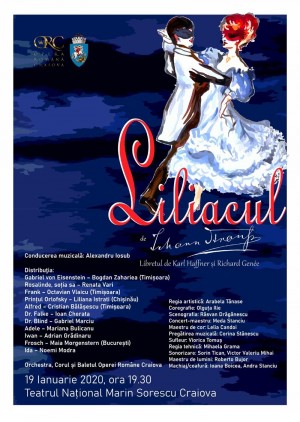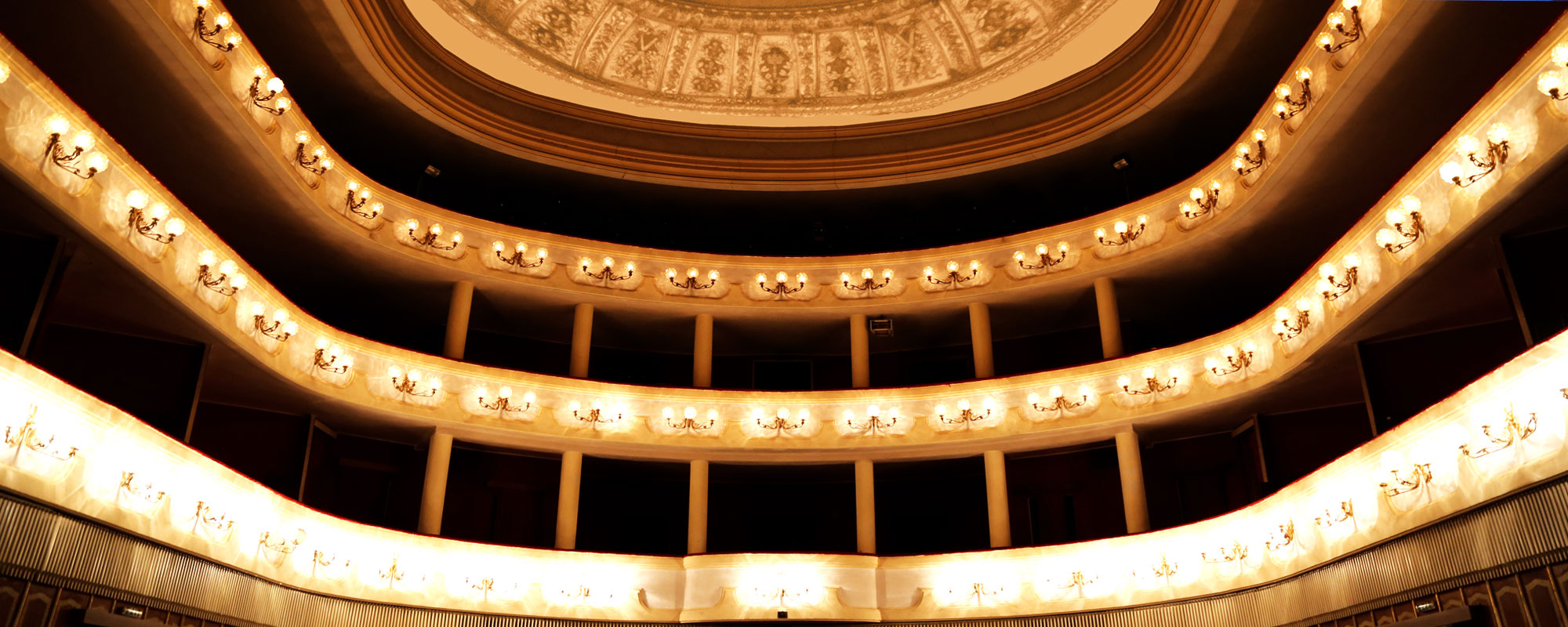Liliacul
Johann Strauss (fiul)

- World premiere
- Theater an der Wien, 5 aprilie 1874
- Romanian Opera Craiova Premiere
- 10 iunie 2007
- Time Length
- aprox. 3h – două pauze
- Extra info
- Spectacol în limba română
Operetta in three acts composed by Johan Strauss II.
Libretto by Karl Haffner and Richard Genée, based on Le Reveillon by Henri Melhac and Ludovic Halévy.
Spectacol susținut de Opera Română Craiova în sala Amza Pellea a Teatrului Național Marin Sorescu Craiova
Conducerea muzicală: Alexandru Iosub
Distribuţia:
Gabriel von Eisenstein – Bogdan Zahariea (Timișoara)
Rosalinde, soția sa – Renata Vari
Frank – Octavian Vlaicu (Timișoara)
Prințul Orlofsky – Liliana Istrati (Chișinău)
Alfred – Cristian Bălășescu (Timișoara)
Dr. Falke – Ioan Cherata
Dr. Blind – Gabriel Marciu
Adele – Mariana Bulicanu
Iwan – Adrian Grădinaru
Frosch – Maia Morgenstern (București)
Ida – Noemi Modra
Orchestra, Corul și Baletul Operei Române Craiova
Regia artistică: Arabela Tănase
Coregrafie: Olguța Ilie
Scenografia: Răsvan Drăgănescu
Concert-maestru: Meda Stanciu
Maestru de cor: Lelia Candoi
Pregătirea muzicală: Corina Stănescu
Sufleur: Viorica Tomuș
Regia tehnică: Mihaela Grama
Sonorizare: Sorin Tican, Victor Valeriu Mihai
Maestru de lumini: Roberto Bujor
Machiaj/coafură: Ioana Boicea, Andra Stanciu
The action takes place on the last day of 1870 and during the 1870-1871 New Year’s night, in the Austrian castle of Weinberg.
ACT I
Some of the main characters meet in the house of the Eisensteins. Dr Falke, the friend of Mr Gabriel Eisenstein, plots a trick in order to take revenge on Gabriel for an older story, when the latter, after a masked ball, had left Falke drunken in a public garden, dressed in a bat costume, to the mockery of the crowd, which is why Falke is now being called “Dr Bat”. Therefore, he provides invitations to the ball of Prince Orlofsky, to Gabriel, his wife Rosalinde and Adele, the family’s maid, from the sister of the latter, the ballerina Ida. However, as of New Year’s night, Gabriel has to serve a sentence resulting from a suit for calumny, that had been lost by the stammering lawyer Blind. Falke convinces him to wear elegant clothes for the date with the “mice” (as Gabriel used to call ballerinas) in prison, actually at the prince’s ball. Adele, in turn, manages to leave for the ball, after some quite obvious lies. Rosalinde is left alone, to face the insistencies of Alfred, an older friend. After Gabriel’s noisy departure, despite Rosalinde’s attempts at not receiving him, Alfred enters the salon and installs himself as master of the house. As Frank, the prison manager, comes to take Gabriel in order to serve his sentence, a confusion arises: Alfred is mistaken by Gabriel and, in order to save Rosalinde’s reputation, he agrees to go to jail. Rosalinde, in turn, finds the invitation for Orlofsky’s ball, left by Dr Falke. She has made her decision: she is going to the ball, as suggested in the letter, in order to see how is Gabriel spending his first night of arrest.
ACT II
The characters in Falke’s charade begin to appear at the ball of Prince Orlofsky, on New Year’s night. Falke assures the prince that he will be very amused. Adele, wearing her mistress’s gown, finds out from her sister Ida that it was not her who invited her to the ball. Eisenstein, introduced as the “Marquis Renard”, has to face the numerous glasses offered by the prince. He recognizes Adele, but Falke tries to convince him that this is Miss Olga. Frank, the prison manager, is introduced as “Chevalier Chagrin”. Rosalinde, dresses as a Hungarian princess, also attends the party. Eisenstein tries to use the “watch effect” on her, as it has helped him to conquer many women. Rosalinde keeps his watch, willing to have arguments against Gabriel, whom she has recognized. At dawn, both Frank and Gabriel remember that they have to go to prison, each one for a different reason.
ACT III
The last act takes place in prison, where we become acquainted with a very funny character, Frosch, the jailer, who keeps repeating: “What a happy prison, sir!”. Alfred is amused by his imprisonment. First arrives Frank, the manager, followed by Adele and Ida, who confess that Adele is not an artist, but she is full of talent. Eisenstein also appears, and Frank finds out he is not the Marquis Renard. The surprises continue: Gabriel, in turn, finds out who has been arrested instead of him and meets lawyer Blind, summoned by Alfred. He wants to take revenge for Rosalinde’s infidelity, disguised in Blind. But, much to his surprise, the Hungarian princess he has courted all night at the ball of Prince Orlofsky takes out her mask: she is his wife. All is well that ends well: the two spouses reconcile, and Prince Orlofsky promises that Adele will become an artist. “A happy prison”, where they drink champagne and everybody sings.
*Titus Moisescu & Miltiade Păun, Ghid de operetă, Editura Muzicală a Uniunii Compozitorilor, Bucharest, 1969


